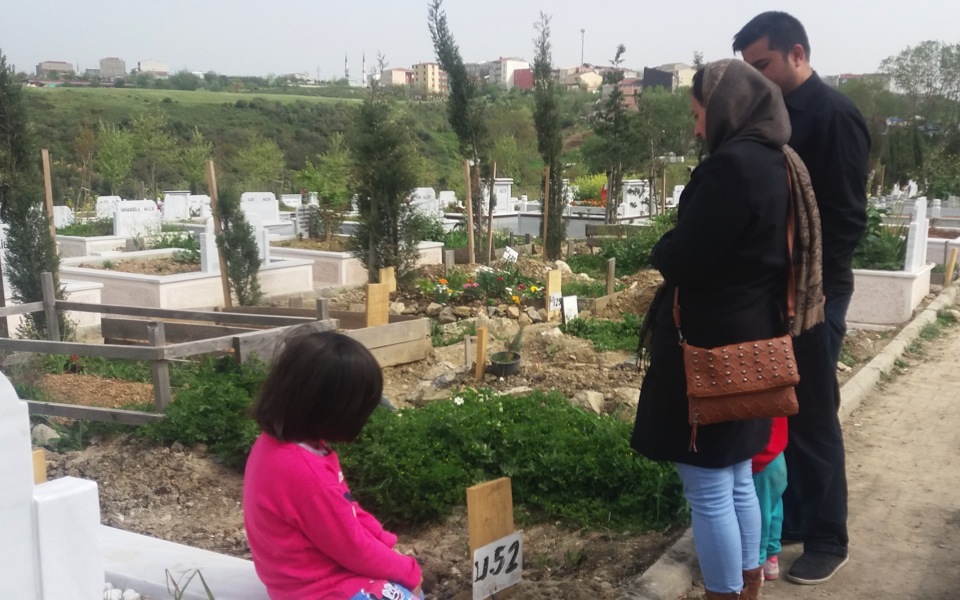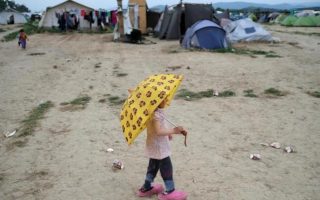Afghan interpreters see their visa dreams fading

It all started with a chilling text message. It was Wali, one of a group of Afghans who worked as interpreters for the Greek military in 2010-12 during NATO operations in the war-torn country. “I’m in Turkey with my family. One of my children died in the waters between Greece and Turkey on March 17.”
Just a few days had passed since Israrullah, his 7-year-old son, suffered a fatal heart attack (according to an autopsy) in a rubber dinghy transporting the family across the Aegean from Turkey. The flimsy craft was adrift all night with more than 50 people on board, all of whom, including the rest of Wali’s family, were rescued by the Turkish coast guard the following morning.
“I don’t know what to do. My son’s body will be released on Monday and then I will take him to the cemetery. My son was scared of the sea,” Wali’s next message said.
Turkish authorities buried young Israrullah in a remote cemetery about a two-hour drive from the center of Istanbul. Wali, his wife and their three surviving children decided to settle in a small apartment in a poor part of the city “to be close to my son,” he says. Afghans do not have the right to apply for asylum in Turkey. Wali had hoped to reach Greece, a country he came to love while working for its armed forces for two years in Kabul.
In January 2015, following a report by Kathimerini, Greek authorities vowed to grant visas to the interpreters and their families. This promise has yet to be fulfilled and their lives remain in danger. Kathimerini traveled to Turkey and Afghanistan to meet them and see how they’re getting on.
Still waiting
“If we had been granted our visas, everything would be OK. We would not have had to face this treacherous journey and maybe we would not have lost our child,” says Wali. “We still get no answer about when we will get them… we just keep waiting.”
Wali gave up his job at a money exchange bureau in Kabul a few months ago after discovering that people with close ties to the Taliban – which has proclaimed all Afghans who worked with NATO as traitors – had found out that he had worked for the Greeks.
“The told me: ‘You worked for foreigners. You are not a good Muslim.’ I knew that if I stayed in Afghanistan any longer, it would be dangerous for my family,” says Wali.
Some of the other Afghans who worked with Wali as interpreters for the Hellenic Army remain in Kabul, but they lost all trace of one, Zahir, over a year ago.
“For two months or more we all ran around together to get the papers needed for the visas. That’s why we are like a family today,” explains one of the interpreters, Wais, in perfect Greek.
We all meet on a Wednesday afternoon, children and wives included, at the home of Omar, who worked for the Greek military for a decade. “It was an entire lifetime,” he says in Greek, smiling.
“When I went to the Greeks my hair was black, now it’s white,” jokes Mukhtar, who sits beside him.
“The truth is that we have waited so long [for the visas] that the things we had in our minds to do, our dreams, are all gone,” says Wais. “Last year I wanted to open a shop in Greece selling precious Afghan stones. Now my only dream is to get the phone call telling us to go to Pakistan to get our visas,” he adds, referring to the fact that there is no Greek embassy in Kabul so they would have to talk with diplomatic authorities in Pakistan.
Rameen, another one of the interpreters, says that he loves his country but is concerned he may soon have no other choice but to flee. “If we don’t get the visa, we’ll have to find some other way, alone,” he stresses. “The least we can do is try to save ourselves. It is better to try than to die here.”
Victim record
The biggest spike in victims of war in any part of the world was recorded in Afghanistan last year. The number of casualties soared to 15,000, twice as many as in 2014 when NATO forces were withdrawn, according to the International Institute for Strategic Studies. The Taliban is fast expanding its hold across the country, forcing Afghans who worked with the NATO multinational forces in previous years either to flee or live in hiding.
“Kabul is a great big prison to me,” says Zacharia. The young interpreter belongs to the Hazara ethnic minority which has been brutally targeted by the Taliban for years. “Those of us who worked with the allied forces cannot go anywhere. I can’t even visit my village, which is just an hour from Kabul.”
In 2015, following a series of articles by Kathimerini on the interpreters’ trials, the issue of the Afghan interpreters caught the attention of the International Association of Conference Interpreters (AIIC), which runs a special program for the protection of interpreters in war zones.
“I got in touch with the person at the Greek Foreign Ministry who is obviously responsible for the case to ask why the visas promised have not been issued,” says the AIIC regional secretary for Greece and Cyprus, Jennifer Fearnside-Bitsios. “The only answer I got was: ‘Why are you bothering me with this issue?’ It was very disappointing. These people deserve an answer at least – will they get the visa or not?”
Both the international and regional offices of the AIIC have sent letters on the issue to the Greek president and several ministers, without, however, receiving any response.
Research by Kathimerini at the ministries of Foreign Affairs and Defense concluded that for over a year, responsibility for the issue at the Foreign Ministry has rested with Petros Mavroidis, former ambassador to Pakistan and current director general of the ministry’s political affairs bureau. Kathimerini tried to reach the official but was redirected to the Interior Ministry’s press office, which declined to make any official comment. Diplomatic sources limited themselves to the comment that the issue is “complicated.”
The order to allow Afghan interpreters who had worked for the Greek military to travel and settle in Greece was given by then defense minister Nikos Dendias on January 16, 2015.
‘Moral obligation’
“The reason was the security problems they faced in Afghanistan after the withdrawal of the Greek forces,” Dendias tells Kathimerini today. “I believed and still believe that we have a duty, a minimum moral obligation, to protect the physical integrity of those who offered their services to our armed forces. All the more so when this was in exceptionally dangerous conditions, as was the case in Afghanistan.”
According to a Kathimerini report a few months ago, the Foreign Ministry had asked the Armed Forces General Staff (GEETHA) to review the initial list of names of Afghans it had sent. GEETHA’s press office told Kathimerini that it had completed all the procedures needed to authenticate the identity of the Afghans, saying that the issue of the visas is now in the ministry’s hands.
“I find it very surprising that 16 months later the interpreters are still not in Greece despite the fact that the armed forces have – as far as I am aware – provided a full and authenticated list of their details to the Foreign Ministry so that the visas can be issued,” says Dendias. “I would like to believe that, even now, the necessary actions will be taken to fulfill the country’s moral obligation and protect these people.”
For Wali and his family, something will always be missing from now on. But what will not be lost, “never, for as long as we are still alive,” he says, is the hope that some day he and his family, as well as his former colleagues back in Afghanistan, will get the visas they are waiting for.
“When we land in Athens it will be like being alive again,” he says.





